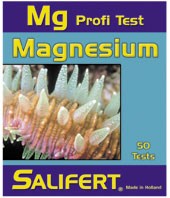Salifert
Salifert Magnesium - Professional Test for Seawater Mg
Salifert Magnesium - Professional Test for Seawater Mg
Couldn't load pickup availability
Magnesium is present in natural seawater (NSW) at a fairly high concentration (1300–1400 mg/L). It is an essential component of chlorophyll, which is necessary for photosynthesis. Without photosynthesis, plants, including algae and corals, which we commonly keep in our aquariums, could not survive.
Magnesium has another important function, as it helps maintain the correct combination of calcium concentration and alkalinity, or carbonate hardness. The explanation is as follows: Calcium forms an insoluble compound called calcium carbonate with carbonates and bicarbonates. Yes, this is indeed an important building block for corals and calcareous algae, but it should be formed through biological processes and deposited in the right places. Therefore, the formation of calcium carbonate through chemical processes should be avoided.
Even without biological influence, calcium carbonate would form and reduce calcium, alkalinity, or carbonate hardness without fulfilling any function. In fact, it would bind many important trace elements and reduce their concentrations. Magnesium slows this negative process. The lower the magnesium concentration, the faster this process occurs, and this occurs at significantly lower calcium and alkalinity/carbonate hardness levels.
Maintaining a correct magnesium concentration is therefore very important, as it is indirectly responsible for the rapid growth of corals and coralline algae by enabling the correct calcium and alkalinity levels. Magnesium is consumed by algae and is also depleted by the excessive use of lime water and by exceeding natural calcium, alkalinity, and pH levels. There are also certain brands of salts that have or have had extremely low magnesium levels. The use of such salts leads to permanent problems with calcium and carbonate hardness levels.
Conclusion: Measuring magnesium and taking corrective action are justified. Magnesium supplements should be designed to prevent ionic imbalance. Many magnesium salts also contain sufficient amounts of ammonia to disrupt biological balance. High-quality magnesium salts are therefore necessary. Magnesium is an element that has long been neglected. In some aquariums, magnesium levels appear to be quite low when tested. Corrective action must be taken to ensure a balanced reef system.
The Salifert Magnesium Test is very easy to use and is unaffected by calcium and strontium interference, as long as they remain within certain limits. It measures in precise increments of 30 mg/L with a distinct color change. The kit can perform approximately 50 measurements.
Safety instructions:
| H332 H373 H412 |
Share


